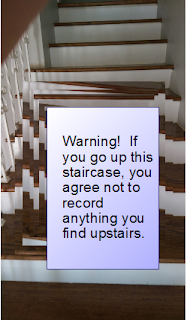Legal contracts will
pervade and regulate virtual reality. Just as end user license
agreements (EULA) govern the use of software, legal terms of use will govern virtual
reality "space." Some terms of use will be like No
Trespassing signs. Others will will be warnings or disclaimers of
liability.
Like the terms of use for web sites or mobile apps, some virtual reality terms of use will prohibit unauthorized activity (example: "You agree not to simulate sexual acts.)
Like the terms of use for web sites or mobile apps, some virtual reality terms of use will prohibit unauthorized activity (example: "You agree not to simulate sexual acts.)
Legal Notices Are Common.
Modern life is
filled with legal notices and contracts. For example, as a visitor
enters a physical building, it is common that the manager of the
building will notify the visitor -- with a legible sign -- that guns
are prohibited inside the building. Notices like this can be legally
enforceable against a visitor: bring a gun into that building, and
you can be ejected and perhaps arrested.
Legal Terms in VR Could Impose a Binding Contract.
In a virtual reality
environment, the terms of use could cover myriad topics. They could
confirm the intellectual property rights of the VR developer. Or they
could restrict the legal power of a user to violate intellectual
property (e.g., a work of art) by, for instance, forbidding the user
from recording the property.
The terms could
limit the power of a user to sue the developer if its data security
is weak. (Example: "You give us your personally-identifiable
information at your own risk. We cannot assure the security of your
information, and we take no liability for any compromise of your
information.")
Or ... the terms
could impose legally-binding fees on a visitor. (Example: "If
you enter this virtual room, you agree to pay VR Dev, Inc. $5.")
Enforcement of terms
would often require the gathering evidence of the terms and how they
appeared in the virtual space. See blog post about capturing legal evidence in virtual or augmented reality.
Legal Terms Might Be
Enforced on Bots.
Google reported that
its DeepMind bot is able to navigate a Doom-like 3D maze similar to
how a physical robot can navigate through a physical building. Cool.
But when a bot
visits a virtual space, legal terms -- written in natural language
not robot language like robots.txt -- might be imposed on it, even
though no human actually set eyes on the terms or interprets the
legal meaning of the terms.
Why do I say that?
Refer to the famous
case Internet Archive v. Shell. Ms. Shell published a web site, and
posted legal terms on that site. The terms said that any visitor to
the site agreed by contract that if it made a copy of a page from the
site it would pay Ms. Shell $5000 per page. Internet Archive engages
in the public service of archiving the Web. Using an automated
program (a bot), Internet Archive made copies from Ms. Shell's
website. Then, Ms. Shell sued Internet Archive for breach of
contract, seeking money! Internet Archive argued in court that it was
impossible for it to enter a contract with her because the copying
was performed by an automated program and no human had reviewed the
terms posted on Ms. Shell's site.
However, on a
first-blush review, the court sided with Ms. Shell. The court ruled
she had sufficiently proven the possibility of breach of contract so
as to force the lawsuit into deeper proceedings.
The risk of deeper
proceedings meant greater cost to Internet Archive and the
possibility of an embarrassing loss in court.
Then Internet
Archive and Ms. Shell settled their dispute. Internet Archive apologized to her,
and she accepted the apology. She dropped her demand for money from Internet Archive.
Ms. Shell achieved a
victory and established the possibility that a bot could be legally
bound to contract terms communicated by natural language.
Legal Notices Will Be Published as Audio.
When Time Magazine's
Lisa Eadicicco tried Microsoft's HoloLens, what surprised her were
the sounds. Through HoloLens, she saw 3D objects as she expected. But
she did not anticipate that the audio would be so meaningful.
She could hear
objects that were out of view! She reported
that she could hear them moving, similar to how we can hear creatures
moving in real space, even though we don't see them. In other words,
a rich VR experience will communicate by way of audio as much as by
video.
Accordingly, some
legal notices and contracts will be posted as audio, and/or they will
attract attention by audio. For instance, as a VR explorer enters a
landscape, she may hear a certain tone to indicate that legal terms apply
to that landscape and she can read them if she so elects.
Notice of a Contract
Might Be Given By Haptic Vibration.
Instead of audio,
however, legal notices might bring attention to themselves through
haptic feedback. For instance, a little vibration on the left side of
a headset might indicate that
- a legal notice is present,
- the legal notice is binding, and
- the user can access the notice (similar to clicking "Legal Terms" link at bottom of web page) if the user so desires.
I am interested to
hear comments on this topic.
See also:
- How to make a legal recording of a "mixed reality" experience.
- Legal measures brand and property owners may take to regulate augmented reality.


No comments:
Post a Comment